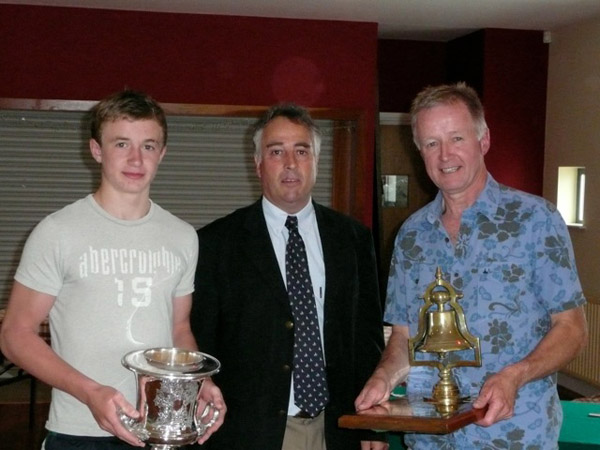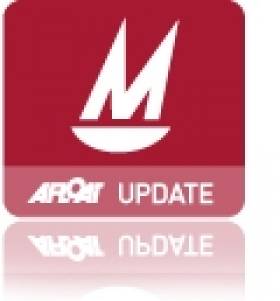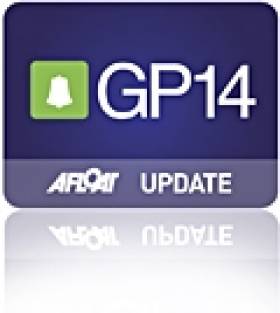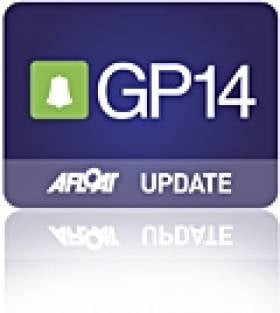Displaying items by tag: Sligo Yacht Club
Mirror Euro Pics HERE!
Photographer Gareth Craig has loaded new images from the Mirror European dinghy championships in Sligo to the Afloat gallery. Click HERE.
Dan Gill Becomes Youngest Ever GP Youth Champion
The GP14 Youth Championship 2010 was held at Sligo Yacht Club on Saturday 24th & 25th July in fresh Force 3 to 4 westerly winds with young sailors from six different clubs vying for honours. Senior sailors within the fleet loaned their boats to promising junior sailors from their home clubs in a bid to demonstrate the appeal of the class.
Don McCormack from Sligo Yacht Club led the fleet around the first weather mark followed closely by Cian Gallagher & Cathal Leigh Doyle also of Sligo Yacht Club in second and third respectively. With spinnakers flying in the strong breeze, the joy of sailing these boats on the reach quickly became apparent. However it was young Dan Gill from Sutton Dinghy Club who revelled in the conditions and quickly moved to the front of the fleet by the gybe mark. The race progressed and approaching the penultimate leeward mark it was Gill with a comfortable lead followed by McCormack and Leigh Doyle fighting it out for second place. Difficulties with the spinnaker in McCormack's boat ensured that Leigh Doyle had an easy second followed home in 3rd place by Conor Byrne & Pamela Lee of Royal St George Yacht Club.
Race 2 saw determined sailors Adam Scott and Eamonn Bourke of Skerries Sailing Club & Sutton Dinghy Club stake their claim on proceedings by sailing a great first beat to arrive at the windward mark in first place. Dave Reddy from Royal St George YC and crewed by stalwart of the class in Ireland Norman Lee arrived next followed closely by Dan Gill with his dad Hugh in the unfamiliar position of pulling the strings in the front for a change. Gill again showed his downwind prowess by moving into second but there was to be no getting past Scott & Bourke who went on to take the gun with the Gills holding onto second and Reddy & Lee taking third.
Race 3 on Sunday again saw the juniors having to hike hard to sail flat with Race Officer Gus Henry changing to a windward leeward course to give some variety. Racing was very close with the fleet bunched at the weather mark. But with a bow in front it was Byrne & Lee around first, then Reddy & Lee followed by the pack. The downwind leg presented lots of options and many were taken. Rounding onto the windward leg it was Byrne, then Reddy and again, young 14 year old Dan Gill not letting go, coming round in third. A tough windward battle ensued with Dan Gill showing perseverance and determination by rounding in first followed by Reddy and then Byrne. Gill led the fleet home with Reddy in second and getting more comfortable with the conditions were Eoin Duggan & Brendan Brogan of Sligo Yacht Club who sailed into third. This result saw Dan Gill become the youngest ever winner of the GP14 Youth Championship of Ireland with a race to spare.

Dan and Hugh Gill, Sutton Dinghy Club with the winning trophies. Photo: Donal McGuinness
Race 4 was again very keen with the fleet tightly bunched all the way round. Duggan & Brogan, getting better all the time, bagged a win followed by Reddy & Lee showing good consistency by again taking second with Cathal Leigh Doyle & James Conlon getting back into the frame with a third. All racers finished within twenty seconds showing remarkable competitiveness.
Final Placings
1. Dan & Hugh Gill, Sutton Dinghy Club
2. Dave Reddy & Norman Lee, Royal St George YC/ Greystones S
3. Eoin Duggan & Brendan Brogan, Sligo Yacht Club
Sligo Yacht Club hosted the GP 14 Summer Open and Irish Youth Championships at Rosses Point on the 24th and 25th July.
26 boats lined up at the start. Gus Henry, himself a GP 14 sailor can always be relied upon to provide exceptional race management. He called back race 1 after a significant wind change. The race started proper a short while after that. Keith Louden and Dessie Hughes from Lough Foyle Yacht Club got to the weather mark first in 12 knots of wind, followed by local sailors Niall Henry and James Conlon. In third, Shane McCarthy and Al Fry followed close behind in their new boat. Niall Henry took line honours in the race after sailing a flawless race and taking the lead on the second beat. Paddy O'Connor and Tania McHale climbed from fourth to take second. McCarthy and Fry took third.
Race 2 followed shortly after. This time, there was a definite interest by Paul Maguire and Niamh McCormick from Sutton SC in the right hand side as the tide was picking up in pace. Alastair Duffin and Paul Whitcombe from Newtownards SC went that way too but not quite as far out. Shane and Fry chose the middle route, while the Mc Guinness Brothers from Moville Boat Club initially went left and then back into the middle right. At the weather mark, Maguire and McCormick had a clear lead with McCarthy and Fry in second with the McGuinness brothers a short distance away. The McGuinness brothers passed McCarthy and Fry on the second reach. Maguire and McCormick maintained their lead to the finish with half a boat length to spare at the end with the Donegal team a close second.
Race three got under way in similar wind to the first day but this time the tide was going out. The boats that went left looked good initially, but their hopes were soon dashed as the right side of the fleet piled in to the weather mark. Henry and Conlon though, who had sailed a middle course got to the weather mark first with about 7 boat lengths to spare. They let nothing slip and finished with a convincing first. With 1-5-1 in a four race series, they couldn't be beaten and didn't start race 4. The McGuinness brothers won race four taking the lead in the first reach, leaving them second overall. Conor Byrne and Pamela Lee, first time GP sailor were second and O'Connor and McHale finished third giving them third in the event.
The silver fleet was won by Nigel Sloane and Laura McFarland with Gerry Gilligan and Lucia Nicholson in second and Johnny Park and Bob Stinson in third.
The bronze fleet was won by Conor Byrne and Pamela Lee, Wai Manu and Don MacCormack in second and Bill Johnson and Stephen Byrne in third.
































































